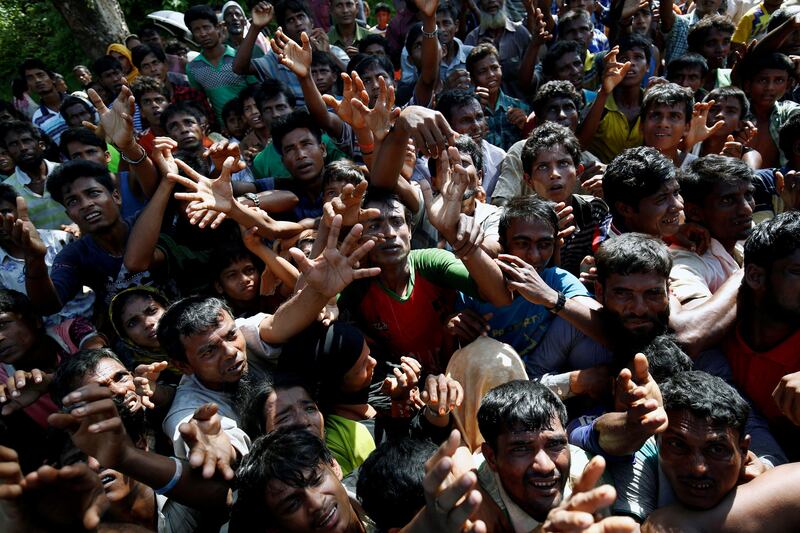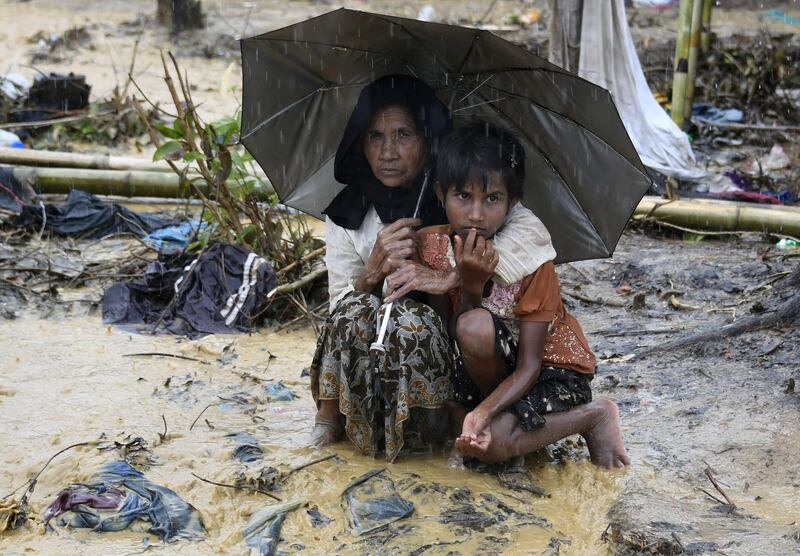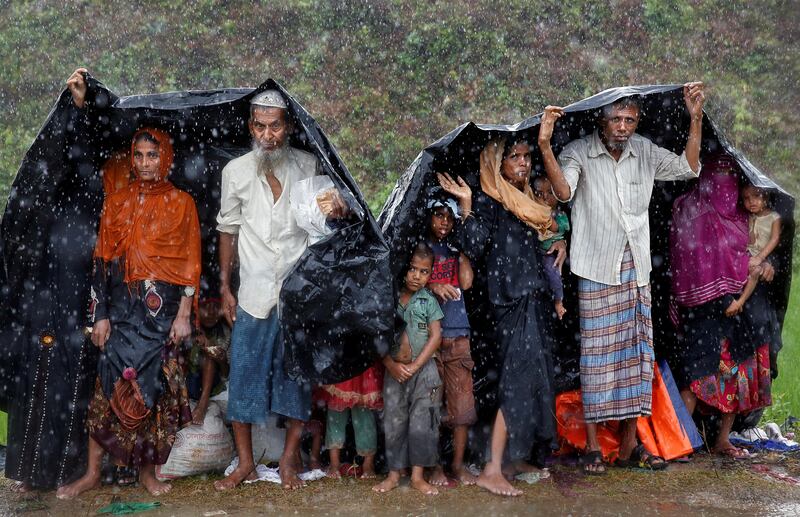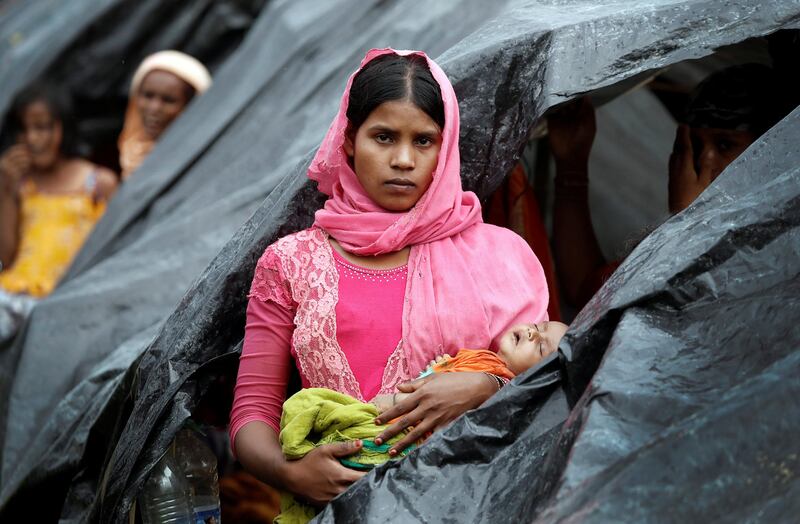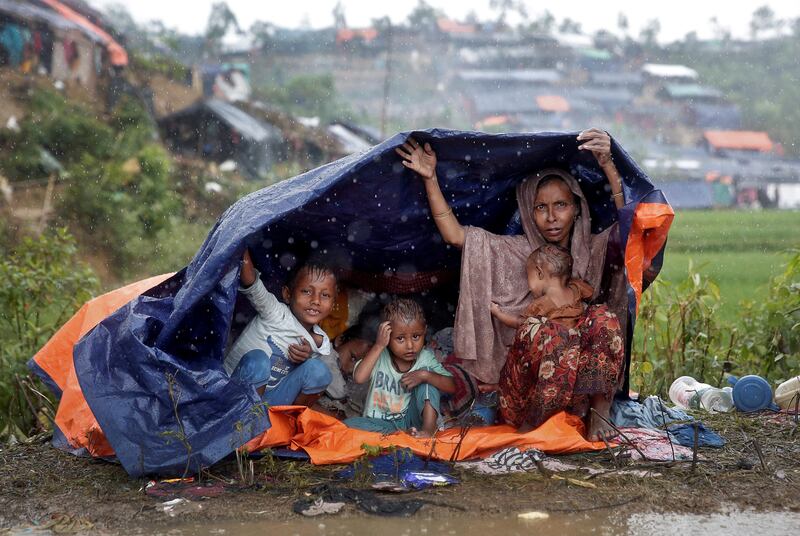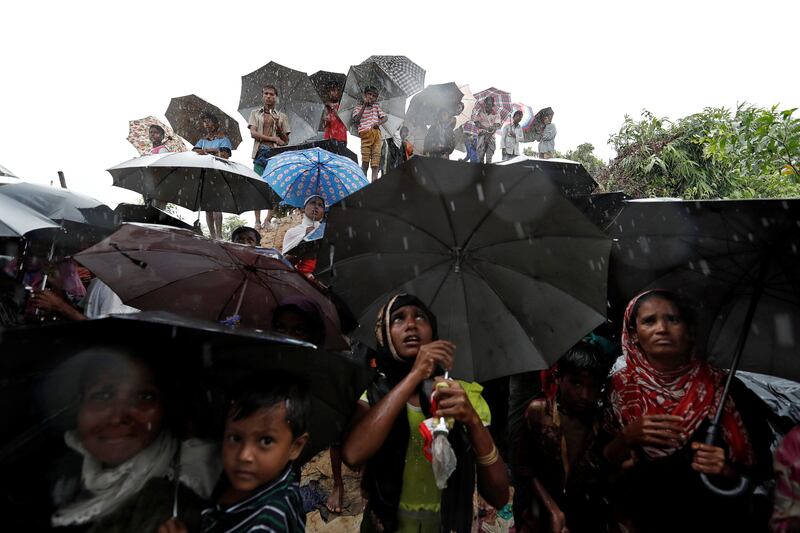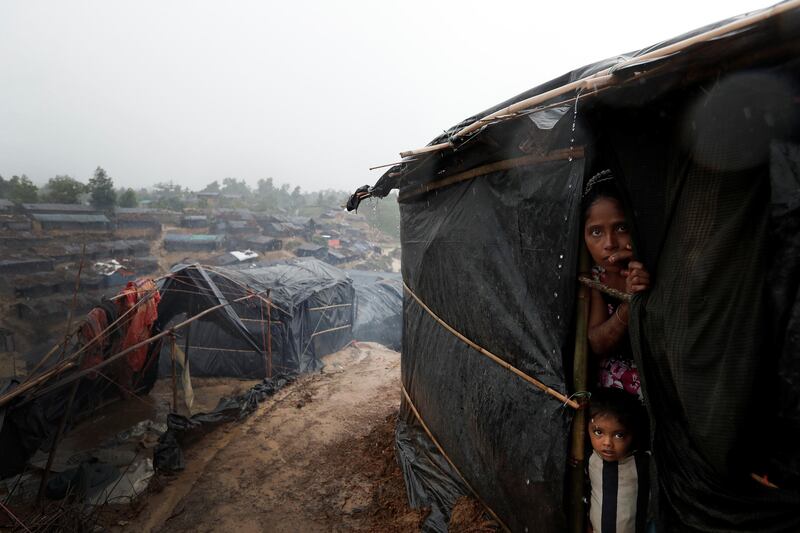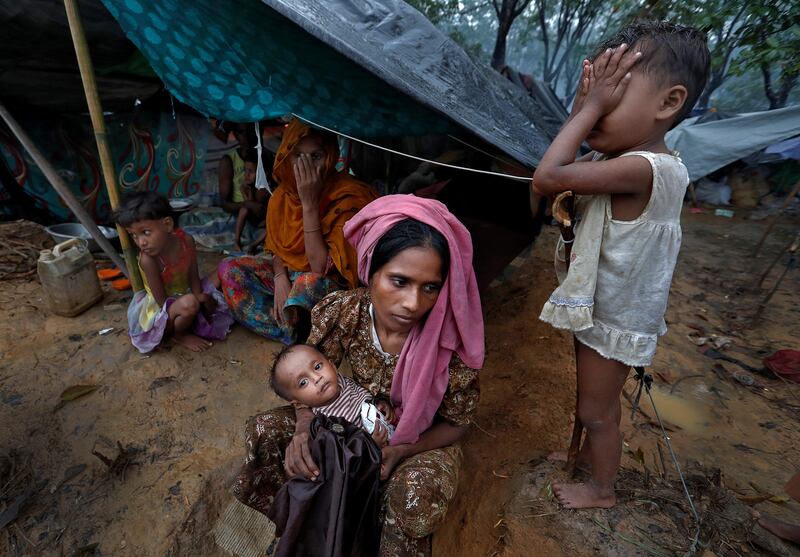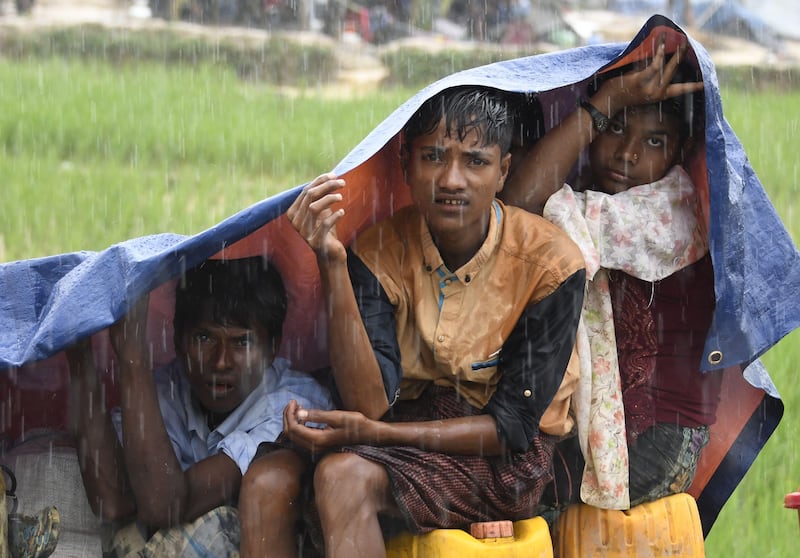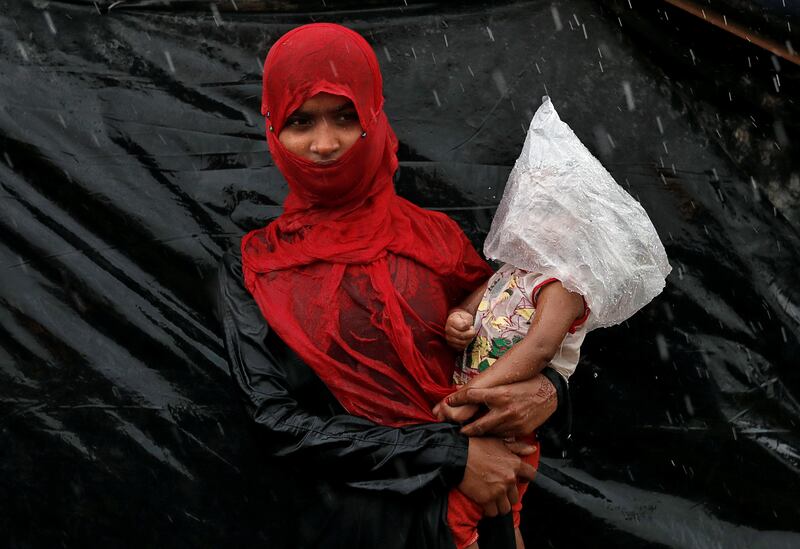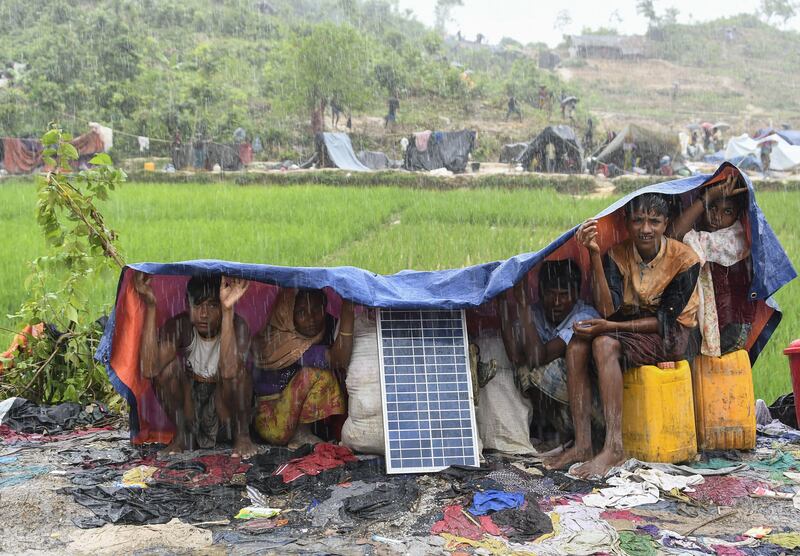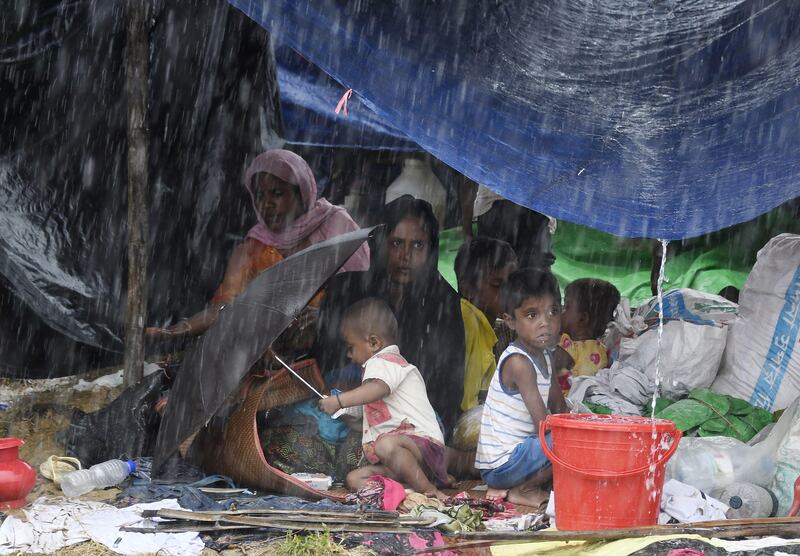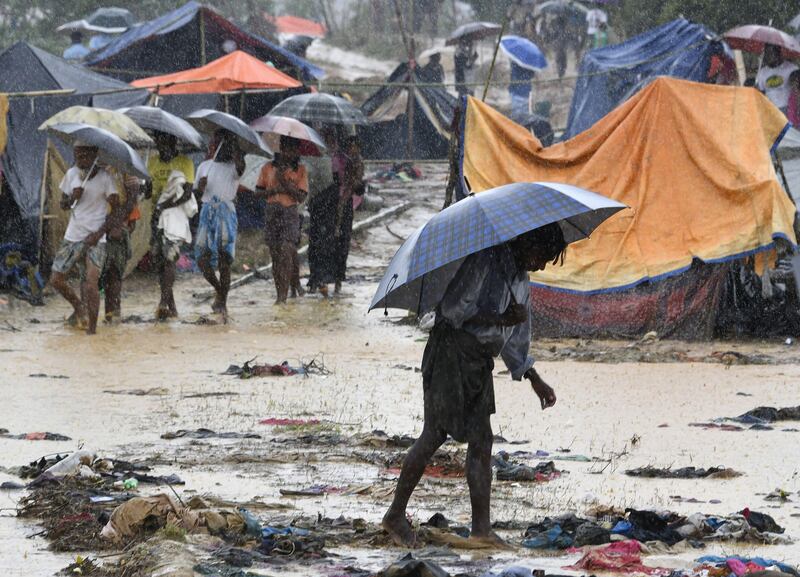Heavy monsoon rain on Sunday heaped new misery on hundreds of thousands of Muslim Rohinyga stuck in makeshift camps in Bangladesh after fleeing violence in Myanmar, as authorities started a drive to force them to a new site.
With food and water shortages already making life tough, torrential rain brought back swamp-like conditions to many parts of the southeastern border district of Cox's Bazar where the majority of Rohingya refugees arriving in Bangladesh have ended up.
About 7.7 centimetres of rain fell in 24 hours, with more predicted in the next two days, the Bangladesh Weather Department said.
Bangladesh authorities, who have already issued travel restrictions on the Rohingya, launched an operation late on Saturday to move tens of thousands out of roadside camps and hillside shanties and into a giant new camp.
Police toured streets with loudspeakers, ordering exhausted families to go to the Balukhali camp in Cox's Bazar.
It came after Bangladesh restricted the movement of Rohingya refugees on Saturday, banning them from leaving overcrowded border areas where over 400,000 are living in squalid conditions.
The tough new measures came as Dhaka struggled to cope with the scale of the "unprecedented crisis", with Bangladesh's prime minister Sheikh Hasina heading for the United Nations General Assembly to plead for global help.
Conditions are already worsening in Cox's Bazar, where the majority of refugees are living in desperate circumstances after fleeing Myanmar's violence-wracked Rakhine state.
Dozens of refugees were found by authorities in three towns hundreds of kilometres from the Myanmar frontier, stoking fears that thousands of newly-arrived Rohingya Muslims could move from the border region and overwhelm the mainland of impoverished Bangladesh.
Police said they had issued an order banning the Rohingya refugees from leaving the areas and camps the government has designated for them in the border district.
"They should stay in the designated camps until they return to their country," Sahely Ferdous, a police spokeswoman, said. "They cannot travel from one place to another by roads, railways or waterways."
Rohingya were asked not to take shelter in the homes of their friends or acquaintances, while locals have been asked not to rent houses to the refugees, and bus and lorry drivers requested not to transport the Rohingya, she said.
Police check posts and surveillance have been set up in key transit points to stop refugees travelling to other parts of the country.
The restrictions were announced as the UN said on Saturday that the total number of people to have entered Bangladesh in the past month had reached 409,000, a leap of 18,000 in a day.
Save the Children warned on Sunday that Rohingya refugees could die due to a lack of food, shelter and water available.
"Many people are arriving hungry, exhausted and with no food or water," said Mark Pierce, Bangladesh country director for the aid agency.
"I’m particularly worried that the demand for food, shelter, water and basic hygiene support is not being met due to the sheer number of people in need. If families can’t meet their basic needs, the suffering will get even worse and lives could be lost."
Bangladeshi authorities have started immunising tens of thousands of Rohingya children against diseases, with the UN saying there are some 240,000 child refugees in dire conditions.
Abdus Salam, a doctor in a state-run hospital in Cox's Bazar, said some 150,000 children will be immunised over seven days for measles, rubella and polio.
Prime minister Hasina left for the UN meeting on Saturday, a day after her government summoned the Myanmar envoy for the third time to protest over its neighbour's actions.
Ms Hasina is to demand more pressure on Myanmar during talks in New York, and is to speak at the UN General Assembly on Thursday.
"She will seek immediate cessation of violence in Rakhine state in Myanmar and ask the UN secretary general to send a fact-finding mission to Rakhine," said a spokesman for the prime minister, Nazrul Islam.
_______________
Read more:
[ The suffering of the Rohingya goes on ]
[ Myanmar says aid access to conflict area not blocked but security an issue ]
[ Amnesty report reveals Myanmar's horrific persecution of Rohingya Muslims ]
[ As Rohingya flee Myanmar, Aung San Suu Kyi skips UN General Assembly ]
_______________
"She will also call the international community and the UN to put pressure on Myanmar for the repatriation of all the Rohingya refugees to their homeland in Myanmar."
Foreign minister AH Mahmood Ali said: "We will continue international pressure on the Myanmar government to immediately end its ongoing ethnic cleansing of the Rohingya."
The Myanmar military says its "clearance operations" in northern Rakhine state are aimed at taking out Rohingya militants who attacked police posts on August 25.
But the violence has engulfed the border region and triggered the exodus of hundreds of thousands of Rohingya to Bangladesh, where they have told of soldiers slaughtering civilians and burning down entire villages.
UN leaders have described the campaign as having all the hallmarks of "ethnic cleansing".
Myanmar's army chief on Saturday urged the country to unite over the "issue" of the Rohingya, claiming the minority ethnic group has no roots in the country.
Many in Myanmar's Buddhist majority view Rohingya as foreign interlopers from Bangladesh and deny the existence of a Rohingya ethnicity, insisting they be called "Bengalis".
"They have demanded recognition as Rohingya, which has never been an ethnic group in Myanmar. [The] Bengali issue is a national cause and we need to be united in establishing the truth," army chief General Min Aung Hlaing said in comments posted to his official Facebook page.
Myanmar's de facto civilian leader, former democracy activist Aung San Suu Kyi, has no power to control the country's army, which retains sweeping powers from its years of junta rule.
But she has been castigated for failing to voice sympathy for the Rohingya — a group she has asked her government to refer to only as "Muslims of Rakhine state".
Aung San Suu Kyi's supporters inside the country, where she still enjoys saintlike status for her democracy struggle, have balked at the global criticism heaped on their leader and argued she must tread carefully around a military that still looms large in the fragile democracy.
In Paris on Saturday, several hundred people, including members of the Rohingya diaspora, protested near the Eiffel Tower to demand international intervention and denounce Aung San Suu Kyi.
The demonstrators urged the former dissident to break her silence on the Rohingya crisis. If not, according to one placard, her Nobel Peace Prize should be renamed the "Nobel Massacre and Hatred Prize".
Aung San Suu Kyi is due to give a televised address to the nation on Tuesday.
